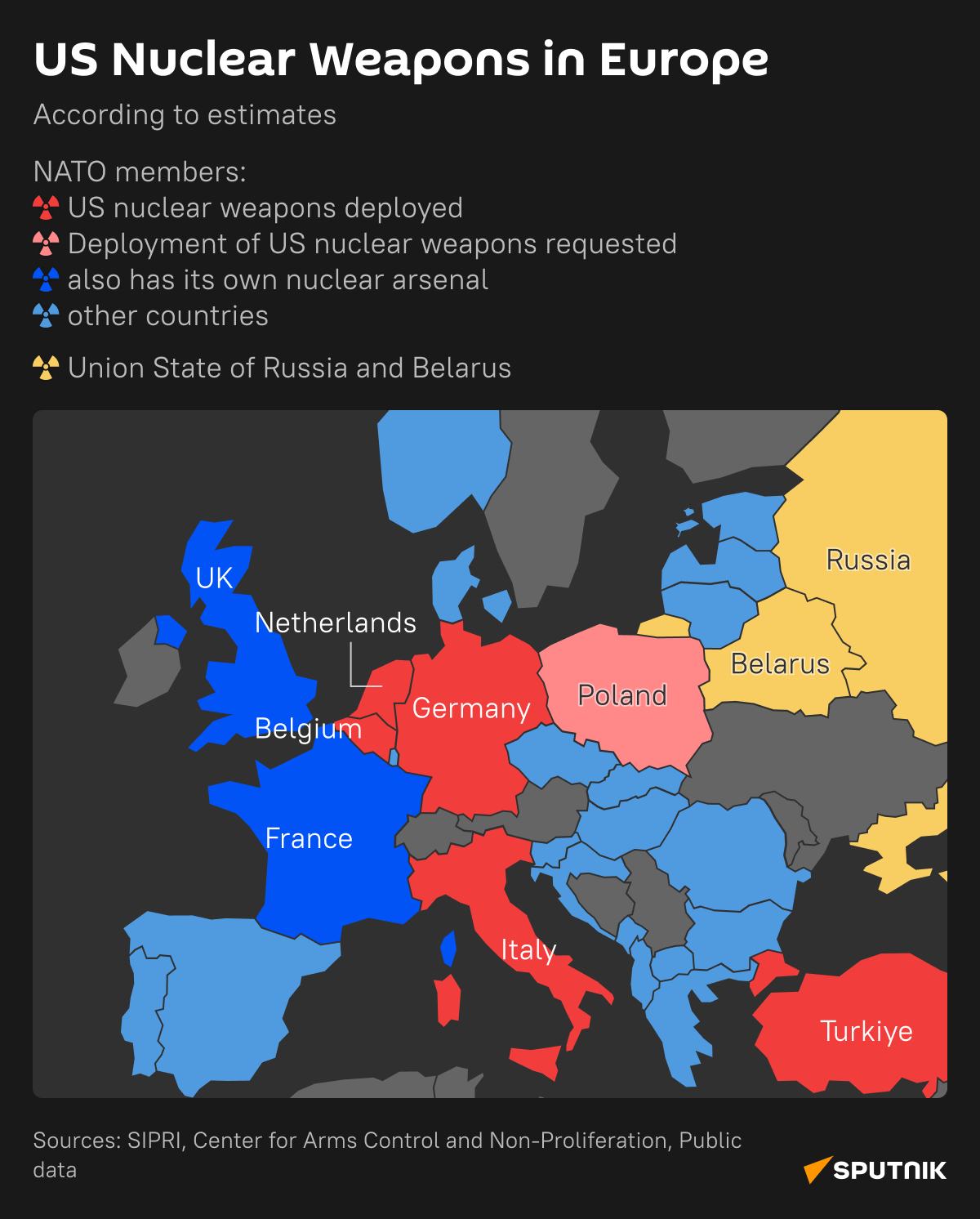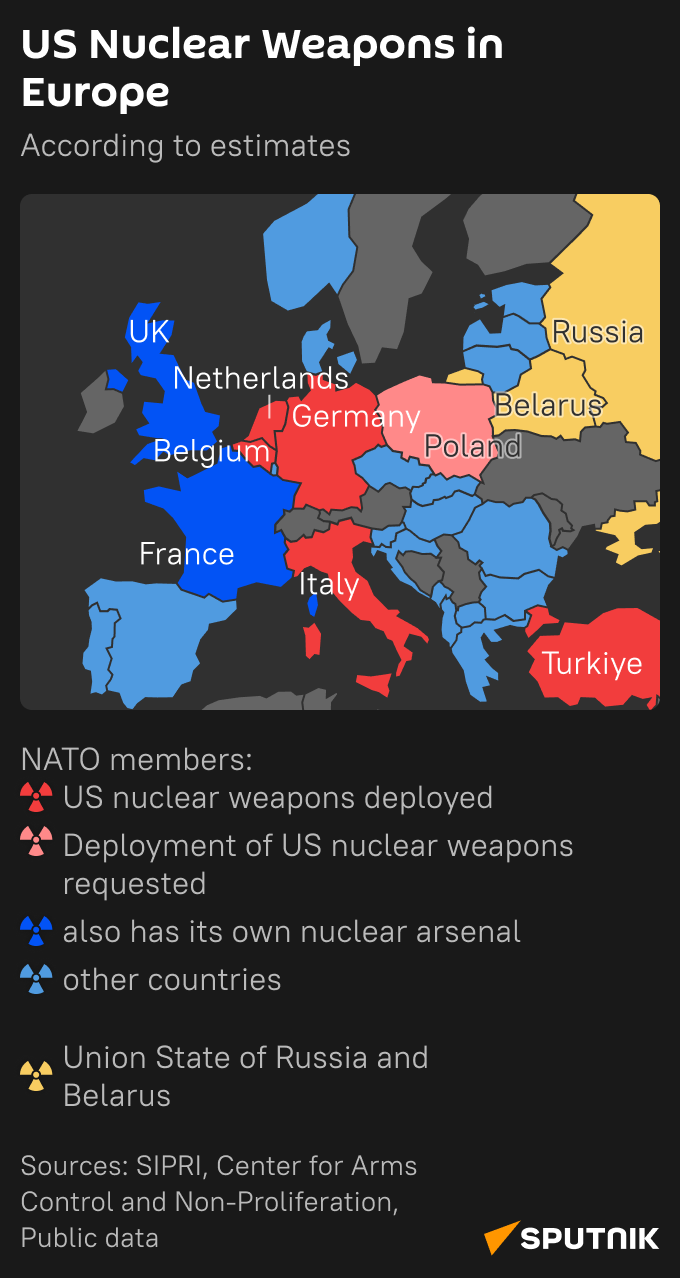https://sputnikglobe.com/20230327/us-nukes-in-europe-where-are-they-stationed-1108844053.html
US Nukes in Europe: Where are They Stationed?
US Nukes in Europe: Where are They Stationed?
Sputnik International
Russia's plans to station tactical nuclear weapons in Belarus sparked an outcry from NATO, with the alliance issuing a statement condemning Moscow for its "dangerous" and "irresponsible" move. But given that the US has around 100 nukes at six separate European bases, the rhetoric seems like a case of the pot calling the kettle black.
2023-03-27T19:21+0000
2023-03-27T19:21+0000
2023-04-08T14:45+0000
multimedia
infographic
us
europe
us nuclear weapons
https://cdn1.img.sputnikglobe.com/img/07e7/03/1b/1108843585_0:0:1280:720_1920x0_80_0_0_f110d2f62ccbb4621fcc98014be9618a.png
The Russian move to deploy nukes on the territory of its Belarusian Union State ally sparked an outcry in Kiev and some of NATO's European capitals on Sunday, with Ukrainian officials demanding an emergency meeting of the UN Security Council, and Berlin accusing Moscow of "another attempt at nuclear intimidation."Washington reacted calmly by comparison, with an anonymous Biden administration official telling media Sunday that there were no signs that Russia planned to use its nukes. National Security Council spokesman John Kirby followed up on Monday by telling reporters the US has not "seen any movement of any tactical nuclear weapons or anything of that kind" since Russia's announcement. "And we certainly haven't seen any indication that Mr. Putin has made some sort of decision to use weapons of mass destruction, let alone nuclear weapons inside Ukraine," he said.The White House's sheepish reaction is likely an indication that it knows perfectly well that it has no grounds to condemn Russia's potential transfer of nukes to an allied nation while the US itself has dozens of nuclear bombs at bases across Europe. Check out Sputnik's infographic to find out where they are.
Sputnik International
feedback@sputniknews.com
+74956456601
MIA „Rossiya Segodnya“
2023
Sputnik International
feedback@sputniknews.com
+74956456601
MIA „Rossiya Segodnya“
News
en_EN
Sputnik International
feedback@sputniknews.com
+74956456601
MIA „Rossiya Segodnya“
Sputnik International
feedback@sputniknews.com
+74956456601
MIA „Rossiya Segodnya“
us, nuclear weapons, us nukes in europe
us, nuclear weapons, us nukes in europe
US Nukes in Europe: Where are They Stationed?
19:21 GMT 27.03.2023 (Updated: 14:45 GMT 08.04.2023) Russia's plans to station tactical nuclear weapons in Belarus sparked an outcry from NATO, with the alliance issuing a statement condemning Moscow for its "dangerous" and "irresponsible" move. But given that the US has around 100 nukes at six separate European bases, the rhetoric seems like a case of the pot calling the kettle black.
The Russian move to deploy nukes on the territory of its Belarusian Union State ally sparked an outcry in Kiev and some of NATO's European capitals on Sunday, with Ukrainian officials demanding an emergency meeting of the UN Security Council, and Berlin accusing Moscow of "another attempt at nuclear intimidation."
Washington reacted calmly by comparison, with an anonymous Biden administration official telling media Sunday that there were no signs that Russia planned to use its nukes. National Security Council spokesman John Kirby followed up on Monday by telling reporters the US has not "seen any movement of any tactical
nuclear weapons or anything of that kind" since Russia's announcement. "And we certainly haven't seen any indication that Mr. Putin has made some sort of decision to use weapons of mass destruction, let alone nuclear weapons inside Ukraine," he said.
The White House's sheepish reaction is likely an indication that it knows perfectly well that it has no grounds to condemn Russia's potential transfer of nukes to an allied nation while the US itself has
dozens of nuclear bombs at bases across Europe. Check out Sputnik's infographic to find out where they are.



